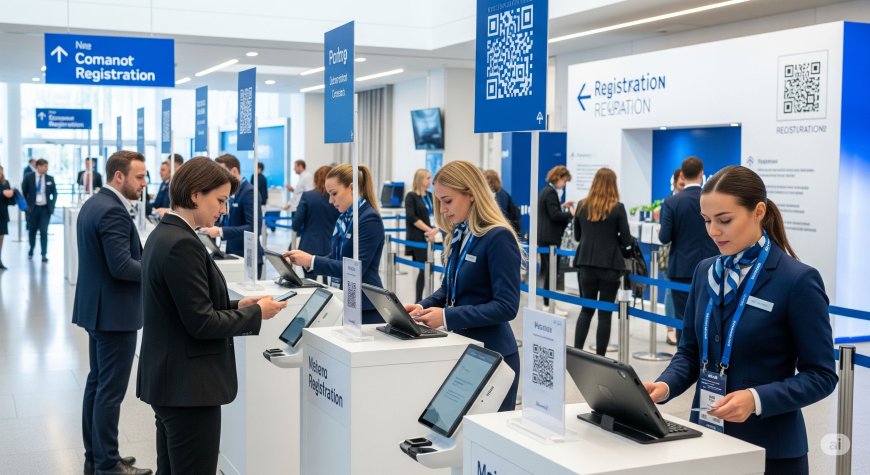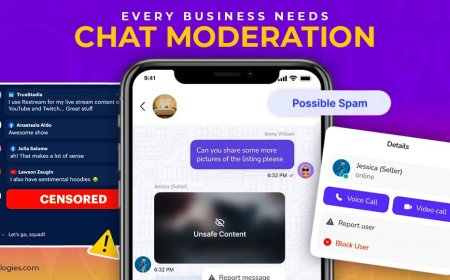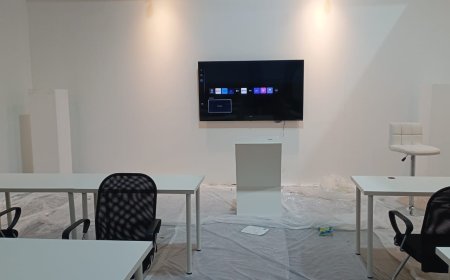9 Conference Registration Management Tips for Your Next Event
Streamline your next event with these 9 expert conference registration tips—boost efficiency, enhance attendee experience, and avoid common pitfalls.

Conferences involve discussions, presentations, workshops, interactions, and several other elements, and that means planning them can be tough when you have a conference registration system that does not work or is hard to work with. Any event needs a system that handles things with ease, and when guests sign up, it does not feel like a huge task when going through the conference event registration process. Many things have to come together to make the event a success. People often forget about managing conference registration until the last minute, which can cause problems. It's more than just getting names and payments. It's how people first see your event. This first impression can shape how they feel about the whole thing. For your event to feel put together, you, as an organizer, need to have confidence in your management system.
Why is conference registration management important?
What is an optimal conference registration management system, and how do you know that you, as an organizer, have it? Let's start by defining what conference registration management means. A conference management system is a software or a platform that facilitates the registration process of attendees enrolling for your event. These platforms can include websites and mobile event apps. Here are 9 tips that will save you the time and burden of working with clunky software, misaligned systems, and an overall bad experience
Build an Online Registration System
The era of spreadsheets and endless email chains for managing registrations is behind us. Modern conference registration management needs an advanced online conference registration system. Look at it as your digital command center, which is skilled at handling data collection, payment processing, confirmation emails, and attendee badging.
A dedicated system simplifies repetitive tasks, minimizes human error, and provides real-time numbers into your registration data. By using a conference management system, you can deal with attendees faster and with fewer mistakes. The systems can automatically keep track of everyone, send confirmations, and give you reports on who is coming. Plus, if your conference scales, these systems can easily handle the extra load without slowing down or making more errors. The systems make the entire process smoother, making sure everyone has a better experience.
When selecting a system, prioritize features such as customizable registration forms, secure payment gateways, the ability to create varied ticket tiers, discount code functionality, and comprehensive reporting. The more sophisticated the features, the greater your flexibility in tailoring the registration experience to your specific event requirements. A well-chosen system functions as an indispensable, silent partner, diligently operating in the background.
Design a Seamless Registration Flow
Attendees are professionals whose time is valuable. The registration process must be straightforward and not overly complicated. A confusing or complex registration flow will likely increase abandonment rates. The main goal is clear: simplicity and transparency.
From the attendee's perspective, when they land on your registration page, is the next step immediately obvious? Are the stages presented in a logical order? Each click should feel intuitive, guiding them smoothly to the next step. Avoid jargon and unnecessary questions. Every field on your form should have a clear purpose. Remember, each additional field can create a potential point of friction.
Use Early Bird Registration
It might seem obvious, but offering early bird registration with good discounts isn't as common as it should be. It's more than just a perk for those who sign up early; it's a helpful method for your conference plans.
Getting people to register early gives you important data. It shows initial interest, which can help you estimate how many people will come. This lets you make smarter calls about catering and seating. Plus, a consistent flow of early sign-ups creates excitement for your event. People see that others are excited to join, and that makes them more likely to want to participate too.
Implement Tiered Pricing
Instead of using a single method, especially for conference attendees, think about using various registration options. This could help increase the number of people who attend and attract a wider range of participants. This is where you can get creative with your conference event registration plans. Consider offering:
- Standard Pass: Your basic entry option.
- VIP Pass: Includes exclusive benefits such as private networking sessions, priority seating, or a dedicated time with speakers.
- Student/NonProfit Discount: Enhances access for a wider audience.
- Group Discounts: Encourages collective registrations from teams or colleagues.
By putting the audience in categories and providing multiple options, you not only increase accessibility but also maximize your possible revenue.
Communicate Clearly and Consistently
Once registration is complete, your communication efforts truly begin. Don't leave attendees in the dark! Immediately send a clear, concise confirmation email. This email should include:
- Confirmation of payment and registration details
- A summary of their ticket
- Essential event information (date, time, location, key contacts)
- Instructions on how to access their badge or check in
Your communication shouldn't stop there. Keep sending timely, relevant updates as the event nears. Consider emails with a "What to Expect" overview, a "Speaker Spotlight," or even "Travel Tips" for attendees coming from afar. These ongoing updates build excitement and helps reduce pre-event nerves. Imagine a first-time attendee arriving at a conference without clear guidancethat would create a poor first impression.
Easy On-Site Event Attendance Check-In and Tracking
After carefully handling the online conference registration, it's very important to make the on-site check-in go well. This is the first time attendees see your event in person, and a long, messy queue can turn them off right away.
Use your conference registration system to get badges printed early, or use fast QR code scans to speed up check-in. Have plenty of helpful staff ready to show people where to go and fix any problems. Setting up separate lines for different types of registration, or a fast lane for people who have pre-verified credentials..
Utilize Registration Data
Your conference registration system is a rich repository of data. It is imperative to analyze this data to derive valuable insights for your subsequent events. Examine:
- Registration trends: When do most registrations occur? Are there specific peaks?
- Popular ticket types: Which tiers garnered the most interest?
- Geographic distribution: What are the origins of your attendees?
- Conversion rates: What percentage of website visitors complete a registration?
This data can inform your marketing strategies, pricing models, and even content development for your next conference. This analytical approach supports continuous learning and iterative refinement of your conference registration management processes.
Prioritize Security and Privacy
In the current digital environment, data security and privacy are non-negotiable. When selecting an online conference registration system, ensure it adheres to the highest security standards, including PCI compliance for payment processing and data encryption. Transparently communicate your privacy policy to attendees. Establishing trust is fundamental, particularly when handling personal and financial information. A data breach is not merely an inconvenience; it represents a significant blow to your reputation.
Gather Feedback for Improvement
After the conclusion of your event, an event survey that includes questions regarding the registration process can be helpful. Inquire the following with attendees:
- How effortless was the registration process?
- Did you face any technical difficulties?
- Were the instructions clear?
- What areas could be improved?
This direct feedback from your attendees is invaluable. It helps in identifying pain points and making improvements to your conference registration management for future events. This shows a commitment from your side as an organizer, which can be quite valuable
In Summary
Conference registration is more than just getting people signed up; it can change how satisfied people are with theevent, how smoothly things run, and how smoothly the whole thing goes. If you use these suggestions, get a good management system involved, and keep attendees at the center of your planning, you can turn registration into a simple and welcoming start to a great event, instead of a stressful problem.



































